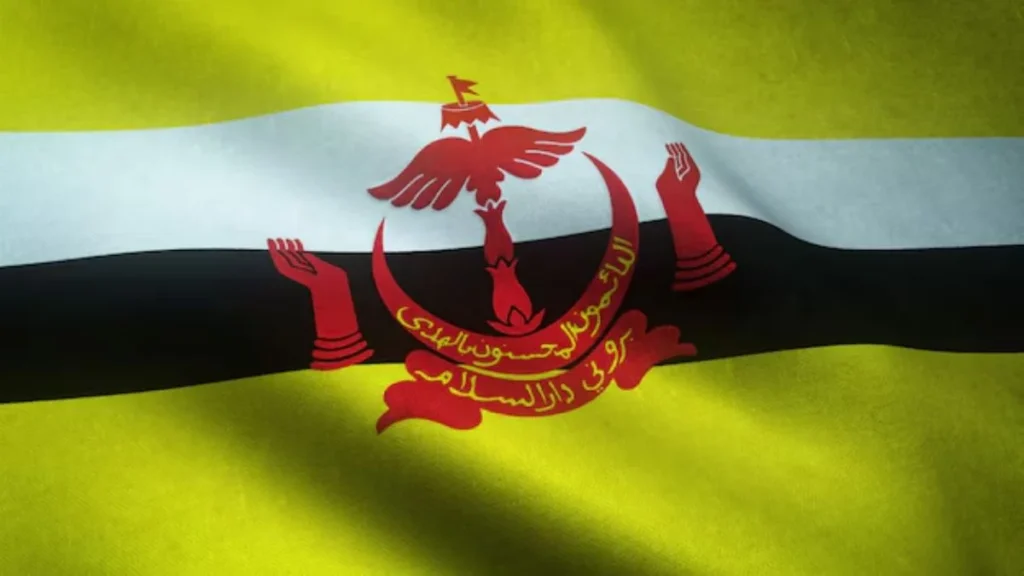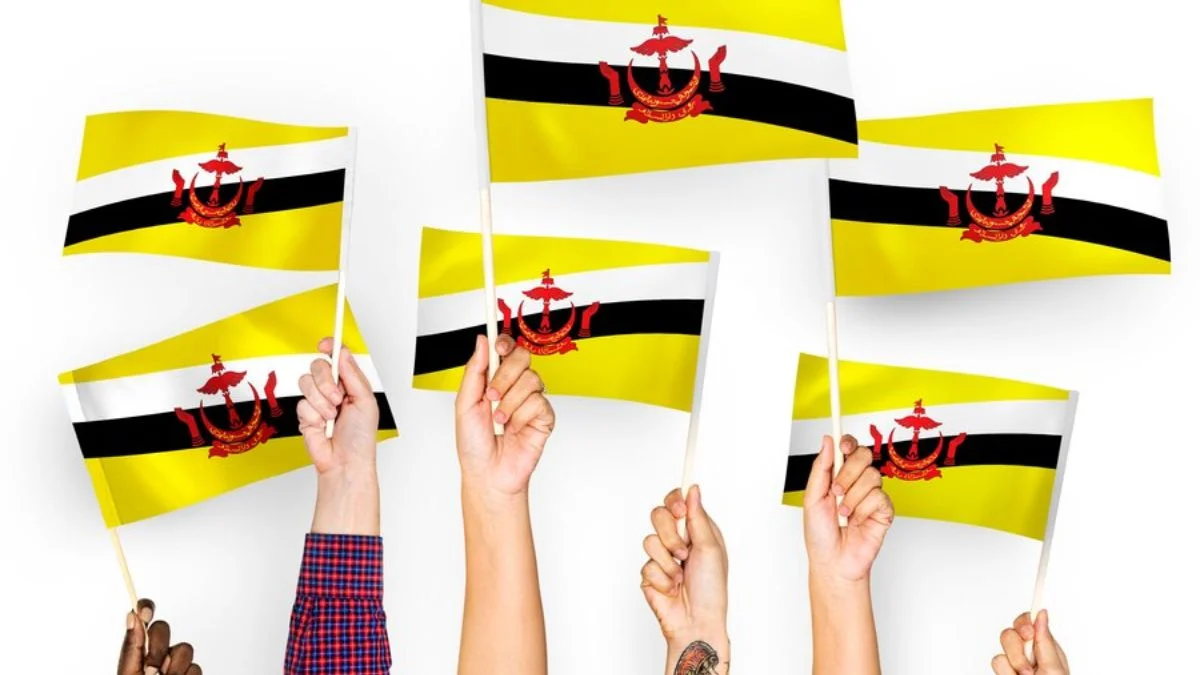Nestled on the island of Borneo, Brunei Darussalam, often referred to as the “Abode of Peace,” is a tiny, resource-rich country in Southeast Asia. Despite its small size, Brunei is known for its rich history, abundant natural resources, and its status as a sovereign state with a high standard of living. Bordered by Malaysia and the South China Sea, this country consists of two distinct land masses, both surrounded by lush greenery and pristine beaches. The capital, Bandar Seri Begawan, is a central hub of culture and politics, showcasing the nation’s wealth and religious heritage.
In this article, we will explore it’s geography, its historical and cultural significance, the country’s status as the “Abode of Peace,” and the intricate relationship between its political structure, religion, and society. We will also address six key frequently asked questions (FAQs) about this fascinating country.
A Brief Overview
Brunei, formally known as Brunei Darussalam, occupies a small area of approximately 5,765 square kilometers, making it one of the smallest countries in the world. Its population is just under half a million people, with the latest estimates indicating about 460,000 inhabitants. The majority of the population resides in the capital city, Bandar Seri Begawan, while the remainder lives in the smaller towns and villages scattered across the country.
Despite its size, it has a robust economy, primarily due to its vast oil and gas reserves. The nation enjoys one of the highest standards of living in the region, with the Sultan of Brunei, Hassanal Bolkiah, presiding over a wealthy and well-educated population. The nation’s high GDP per capita reflects its affluent status, allowing it to provide free healthcare, education, and other services to its citizens.
The History of Brunei
Brunei’s history can be traced back over a millennium, with evidence suggesting that it was an important trading hub as early as the 7th century. Initially, the Brunei Kingdom adopted various local religious practices, including animism and Hinduism, before embracing Islam in the 14th century. The nation’s conversion to Islam was a pivotal moment, which not only shaped its religious and cultural identity but also solidified its political relationships with other Muslim sultanates in Southeast Asia.
The rise of the Sultanate of Brunei began in the 15th century, when it became a dominant maritime empire, exerting influence over much of the island of Borneo, as well as parts of the Philippines and the southern Malay Peninsula. The Bruneian Empire reached its zenith under Sultan Bolkiah (r. 1485–1524), whose reign is remembered as a golden age of expansion and prosperity. The sultanate’s decline began in the 17th century due to internal conflicts and European colonization.
By the 19th century, Brunei had lost much of its territory to European powers, particularly the British. In 1888, this became a British protectorate, a status that lasted until its independence in 1984. Today, this remains one of the few absolute monarchies in the world, with the Sultan holding significant political, economic, and religious power.
Why is Brunei Called the Abode of Peace?
The name “Brunei Darussalam” holds great significance in the country’s identity. “Darussalam,” which translates from Arabic as “Abode of Peace,” reflects it’s commitment to maintaining a peaceful, harmonious society. This title is deeply intertwined with the country’s Islamic values, which promote social stability, justice, and compassion.
It’s peaceful nature is not only seen in its political stability but also in the day-to-day lives of its people. The government places a strong emphasis on maintaining law and order, promoting unity among the different ethnic and religious groups, and providing social welfare services that ensure a high quality of life for its citizens. Additionally, it has managed to stay out of major conflicts, both regionally and internationally, further earning its reputation as a peaceful nation.
Religion: The Core of National Identity
Islam as the State Religion
Islam plays a central role in the identity of Brunei and is enshrined as the state religion under the country’s constitution. The Sultan, as both the head of state and the religious leader, ensures that Islamic principles guide the nation’s laws and governance. This adheres to Sunni Islam, specifically the Shafi’i school of thought, which influences the legal system, public policy, and daily life.
One of the most important expressions of Brunei’s Islamic faith is the construction of magnificent mosques, such as the iconic Jame’Asr Hassanil Bolkiah mosque in Bandar Seri Begawan. The mosque, with its 29 golden domes, stands as a symbol of the nation’s devotion to Islam and its royal heritage.
Religious Composition of the Population
While Islam is the official religion, it is home to a diverse population with various religious beliefs. According to recent estimates, approximately 80% of the population is Muslim. The remaining population consists of Buddhists (around 7%), Christians (around 9%), and indigenous beliefs (around 4%).
It’s commitment to religious harmony is enshrined in its policies. Although Islamic law is strictly enforced for the Muslim majority, non-Muslim communities are permitted to practice their faiths without fear of persecution. Religious festivals, such as Christmas and Chinese New Year, are widely celebrated by non-Muslim communities, and interfaith dialogue is encouraged to foster mutual understanding.
Brunei Religion Before Islam
Before Islam became the dominant religion in Brunei, the region was influenced by various religious practices, including animism, Hinduism, and Buddhism. The indigenous tribes of Borneo practiced animistic beliefs, worshiping nature spirits and ancestors. As early as the 7th century, it had interactions with Hindu and Buddhist empires, leading to the adoption of elements of these religions in the royal courts.
The spread of Islam in Brunei began in the 14th century, likely facilitated by trade with Muslim merchants from the Middle East and India. The conversion of Sultan Muhammad Shah (r. 1363–1402) marked the beginning of the Islamic era in Brunei, and by the 15th century, Islam had firmly established itself as the state religion.

The Role of the Sultanate
The Sultan of Brunei, Hassanal Bolkiah, is not only the political leader but also the religious authority of the nation. His rule is characterized by absolute monarchy, with no elected parliament or opposition parties. The Sultan holds the titles of Prime Minister, Minister of Defense, Minister of Finance, and Minister of Foreign Affairs, consolidating power in his hands.
The Sultan’s wealth is another notable aspect of his rule. Thanks to Brunei’s vast oil and gas reserves, the Sultan is one of the wealthiest monarchs in the world. His opulent residence, the Istana Nurul Iman, is the largest residential palace globally, with 1,788 rooms, 257 bathrooms, a mosque, and a banquet hall capable of hosting 5,000 guests.
Despite the concentration of power, the Sultan is widely revered by the people for his benevolent leadership and his efforts to improve the quality of life in Brunei. Under his rule, it has remained politically stable, economically prosperous, and socially harmonious.
Economy of Brunei: The Oil and Gas Powerhouse
it’s economy is primarily driven by its oil and natural gas industry, which accounts for over 90% of its exports and around 60% of its GDP. The country’s abundant hydrocarbon resources have allowed it to achieve one of the highest per capita incomes in the world, with citizens benefiting from extensive social welfare programs, including free healthcare, education, and housing.
The government has also made efforts to diversify the economy by investing in sectors such as halal food production, tourism, and Islamic finance. However, progress in these areas has been slow, and Brunei remains heavily dependent on its energy resources.
The national currency of Brunei is the Brunei dollar (BND), which is pegged to the Singapore dollar at a 1:1 exchange rate. The strong currency and low inflation rates have contributed to the country’s stable economic environment, allowing Bruneians to enjoy a high standard of living.
Biodiversity and Natural Beauty
One of Brunei’s greatest assets is its rich biodiversity. The country is home to vast tracts of tropical rainforest, much of which is protected within reserves such as the Ulu Temburong National Park. These forests are home to a variety of wildlife, including orangutans, clouded leopards, and over 400 species of birds.
It’s commitment to conservation is evident in its environmental policies, which aim to preserve the natural beauty of the nation while promoting eco-tourism. Visitors can explore the rainforest through guided tours, canopy walks, and river cruises, all of which highlight the unique flora and fauna of the region.
In addition to its rainforests, it boasts pristine beaches along the South China Sea. The country’s coastal areas offer opportunities for swimming, snorkeling, and other water activities, making Brunei a hidden gem for eco-tourism enthusiasts.
Conclusion
Brunei Darussalam, the “Abode of Peace,” is a nation that defies its small size with its rich history, abundant natural resources, and strong Islamic values. From its impressive mosques to its biodiverse rainforests, it offers a unique blend of cultural heritage and natural beauty. As an absolute monarchy with a strong emphasis on Islamic principles, the country enjoys political stability, economic prosperity, and social harmony.
With its strategic location on Borneo, Brunei is poised to continue thriving, even as it faces the challenges of economic diversification and global environmental sustainability. Whether you are drawn to the country’s opulent palaces, its rich religious heritage, or its commitment to preserving the natural world, Brunei is a destination that offers peace, beauty, and cultural depth.
FAQs
Is Brunei a country?
Yes, this is a sovereign nation located on the island of Borneo, bordered by Malaysia and the South China Sea.
What is the religion of Brunei?
Islam is the state religion of Brunei, specifically the Sunni branch following the Shafi’i school of thought. The majority of the population are Muslims, although other religions such as Buddhism and Christianity are practiced by minority communities.
Why is Brunei called the Abode of Peace?
The term “Darussalam,” meaning “Abode of Peace,” reflects Brunei’s commitment to social harmony, political stability, and peaceful coexistence among its diverse population.
What is the population of Brunei by religion?
Approximately 80% of Brunei’s population practices Islam, while the remaining population is made up of Buddhists (7%), Christians (9%), and practitioners of indigenous beliefs (4%).
What was the religion of Brunei before Islam?
Before the adoption of Islam in the 14th century, it’s population practiced a variety of religions, including animism, Hinduism, and Buddhism.
What currency is used in Brunei?
The currency of Brunei is the Brunei dollar (BND), which is pegged to the Singapore dollar at a 1:1 exchange rate.









